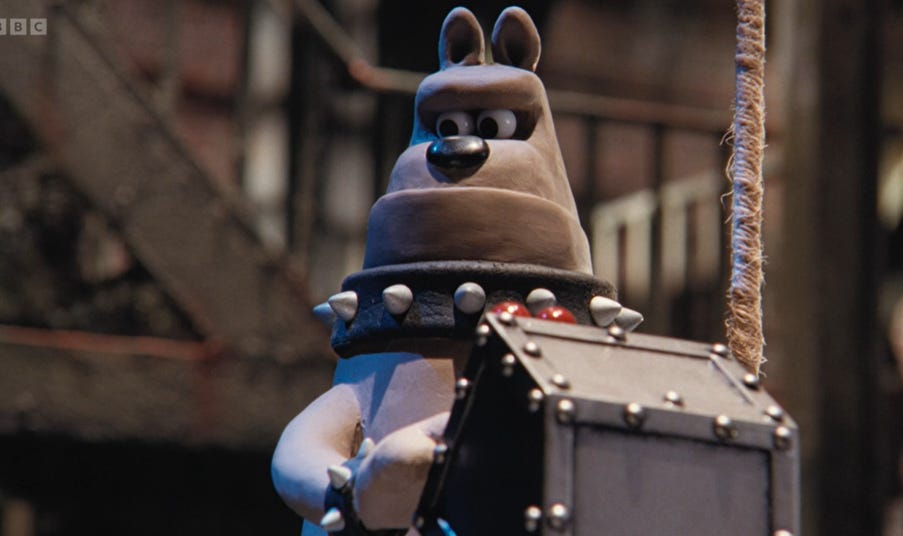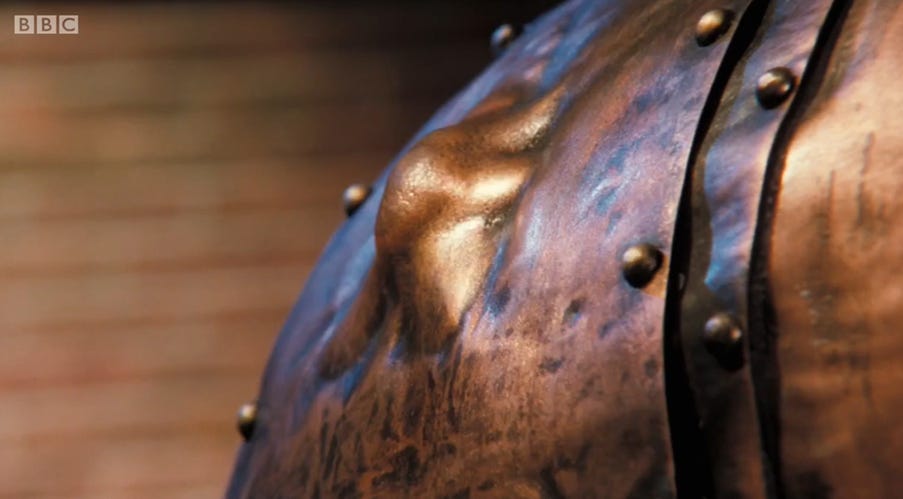“Daddy created him for good!” The flaying of Preston in A Close Shave
Horror Moments, Wallace and Gromit Edition
‘Horror Moments’ is a light-hearted series examining horror-inflected scenes and themes in unexpected places. The ‘moments’ are published weekly on Thursday mornings, and I share bonus content on the history of magic, theatre, storytelling, and more on Monday afternoons – don’t forget to subscribe!
[Spoilers: Wallace and Gromit: A Close Shave (1995), The Black Cat (1934)]
24 minutes into Aardman Animation’s 1995 short Wallace and Gromit: A Close Shave, the lives of Lancastrian inventor Wallace, his wool-selling love interest Wendolene, his longsuffering dog Gromit, and a farmyard’s worth of sheep are hanging in the balance.
The dastardly Preston, Wendolene’s pooch, has reconfigured one of Wallace’s inventions so that it doesn’t just shear sheep, but will mince them into dog food along with anyone else who gets in his way.
But thanks to Shaun, a plucky young sheep, Preston is sucked up into his own machine. The switch is flicked from medium to ‘close shave’ and the knit-o-matic springs to feverish life, mechanical arms peddling in and out of the great copper tank doing something that we can’t quite see to Preston.
Out come threads of what might be fur, or might be skin, knitting a jumper more or less the size and shape of the dog who has disappeared inside when suddenly—
CLANG!
Something punches a dent in the machine.
CLANK CLANK!
The peddling arms jam and pull back, strips of something silver mangled in their grip.
“He’s malfunctioning.” cries Wendolene. “Daddy created him for good but…he’s turned out evil!”
[Cue dramatic music]
Because, as the flaying of his fur and skin reveals, Preston is no ordinary dog.
In Renaissance art and medicine, an ‘écorché’ was an anatomically correct figure whose skin had been removed. Such images were useful when actual human dissection was banned so that doctors and artists alike could accurately understand how the body works.
Horror films have, of course, been more interested in the idea of the flaying itself, a particularly slow, excruciating fate. In The Black Cat (1934) Boris Karloff is subjected to this torture by Béla Lugosi who has trussed him up on his own embalming rack.
“Did you ever see an animal skinned?” he asks him with sadistic glee.
Some films seem particularly interested in the metaphorical resonance of the practice, with the removal of skin symbolising revelation and the quest for truth. There’s one film in particular that makes this connection — but I’m not even going to mention its name because it’s such a spoiler. If you know, you know.
Preston’s transformation is, of course, also a ‘he’s really a robot’ twist, and in general there’s something scary about a thing that seemed human (or in this case, canine) turning out to be a strange unfeeling other. Created for good, he has malfunctioned – or perhaps chosen evil. His fate is yet more morally dubious: has Wallace ‘fixed’ a broken device, or lobotomised a new intelligence? The viewer must decide.
Preston the écorché stares blankly at us through eyes without a face. He is a truth laid bare, a warning about the dangers of playing god, of artificial intelligence, and of leaving a piece of precision engineering in the hands of a person whose expertise is mostly in wool.
I’ve started with A Close Shave because it’s arguably the most frightening of the original three shorts, but there’s plenty more where that came from. Wallace and Gromit is s surprisingly horror-literate series, where Victoria Woodisms about the minutiae of everyday British life bump up against references to slashers and the Alien franchise. The first ten horror moments in this series will be from Wallace and Gromit and I’m excited for the next one but for now—
Happy nightmares everyone!
Horror moments are posted every Thursday and a wide variety of articles exploring the history of magic, theatre, storytelling, and more are published on Monday afternoons.













Many of these subtleties went over my head watching these with my small children!
Love your insights
The sound quality is great, and your voice is so lovely!